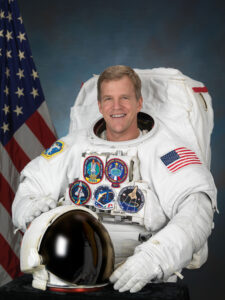

Dr. Scott Parazynski is a highly decorated physician, astronaut, author and tech CEO, inducted into the US Astronaut Hall of Fame in 2016. He is a widely sought after keynote speaker on innovation, risk management, mentorship and leadership under extreme adversity.
Scott has lived and traveled all over the world, spending many of his grade school years in places such as Senegal, Lebanon, Iran and Greece. A graduate of Stanford University and Medical School, he went on to train at Harvard and in Denver for a career in emergency medicine and trauma.
In 1992 he was selected to join NASA’s Astronaut Corps and eventually flew 5 Space Shuttle missions and conducted 7 spacewalks. Mission highlights include a global ozone mapping flight; leading the first joint US-Russian spacewalk while docked to the Russian space station Mir; serving as Senator John Glenn’s crewmate and “personal physician”; and assembly of the Canadian-built space station robotic arm.
In October 2007, Scott led the spacewalking team on STS-120, during which he performed 4 EVAs. The final EVA is regarded by many as one of the most challenging and dangerous ever performed. The tremendous coordinated effort in orbit and on the ground by Mission Control has been likened to the Space Shuttle and Space Station era’s “Apollo 13 moment.”
In addition to being a diver and accomplished mountaineer, Scott is also a commercial, instrument, multiengine and seaplane-rated pilot. On May 20, 2009, he became the first astronaut to stand on top of the world, the summit of Mount Everest. As a life-long explorer, he and a colleague recently set the first bootprints adjacent the world’s youngest lava lake, inside the crater of Masaya Volcano in Nicaragua.
He is a prolific inventor/product developer, and serves on the Boards of several companies. He is Founder and CEO of Fluidity Technologies, focused on the development of revolutionary input devices powered by machine learning to intuitively move through physical and virtual space.
www.parazynski.com
www.fluidity.tech
twitter.com/astrodocscott
The Sky Below

What is your background, where did you grow up?
I was born in Little Rock, Arkansas, where my father was working for the USAF Missile Command, an early predecessor to today’s “Space Force.” He transitioned to Boeing in the early Apollo Program, and we then lived in New Orleans and in the Washington, DC area. After Apollo XVII, as Boeing was diversifying into international markets, we lived in Dakar (Senegal), Beirut (Lebanon), Athens (Greece), and Tehran (Iran). I’ve been chased out of not just one but two countries because of civil unrest (on account of the Lebanese civil war and the Iranian Islamic revolution).
After college and medical school, I landed my dream job at NASA, and flew five Space Shuttle missions. Since then I’ve been working in all manner of tech, currently as Founder and CEO of Fluidity Technologies. We’ve revolutionized motion control through physical and virtual space… [Think drones, computer games, augmented reality, flying cars, cranes and surgical robotics: www.fluidity.tech]

When did you first become interested in space?
I grew up in the shadow of the Apollo program, where I had a front row seat to astronautics. Dad would bring back Saturn V photos and flight plans from work, and I’d build and lose model rockets all over the neighborhood. One of my lasting memories was traveling to Cocoa Beach to see the launch of Apollo IX from the surf, and less than five months later watching Neil and Buzz hop on the moon during Apollo XI. From that point onwards, I wanted to be on the first crewed mission to Mars. I guess there’s still a very remote, outside chance…(!)

What do you think the biggest issue facing the industry today?
I’m most fearful that NASA lacks a long-term plan that can withstand transitions in government. Each US President in recent history has put their own unique signature on what NASA should be doing, and its resulted in enormous inefficiencies and many canceled PowerPoint space initiatives. I’m very excited about Artemis and a pathway to the eventual human exploration of Mars, but I feel it needs to be inked into a decadal plan. In so doing, ambitious human spaceflight goals would be immunized to a degree from politics and budget variances, much as the agency has done for its highly successful science programs over the years.
In terms of commercial human spaceflight, the uncomfortable truth is that some new ventures are likely to fall by the wayside. There are certainly a finite number of high net worth astronaut aspirants who can afford lofty ticket prices to suborbital space, but is there a real and rapid pathway to cut the price point by 10x or more? I see this as absolutely essential in order for them to create sustainable businesses.

What do you like to do for fun?
Spending time with family and friends in a pre-pandemic world; adventure travel and even higher adventure sports; prototyping my inventions in the workshop; and flying drones when I can’t fly someone else’s airplane.

What is your favorite movie and why?
Monty Python and the Holy Grail
“It’s just a flesh wound…” Takes me back to my med school days…

What are some of your favorite books?
-
Into Thin Air, by Jon Krakauer
-
Into the Woods, by Bill Bryson
-
On the Origin of Species, by Charles Darwin
-
Gödel, Escher, Bach: An Eternal Golden Braid, by Douglas Hofstadter

What are you reading now?
Guns, Germs, and Steel, by Jared Diamond

Where do you see the space industry in ten years?
With the cost of access to space continuing to drop, the entire planet should be online and connected through vast satellite networks. The space services industry in low earth orbit will flourish, and I hope we’ll see a vibrant suborbital/orbital tourism and science traffic flow.
I also hope that we’ll have a permanent lunar outpost staffed by then, and that we’ll be sending precursor habitats to the Martian surface soon thereafter.

What would you tell people just starting out in the space industry?
The need for bright young minds in the industry has never been greater – to include many other fields beyond the traditional engineering and scientific backgrounds of the past. In the coming decades we’ll be moving off of Planet Earth for good, and it will take every skill set to make it come about. For those interested in flying one day, it’s also important to note that the pathway to the stars isn’t just by way of NASA and its prime contractors anymore… NewSpace companies like SpaceX, Blue Origin and Virgin Galactic might have a seat for you too.

